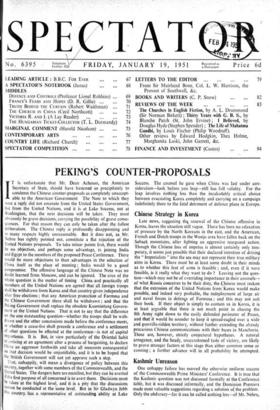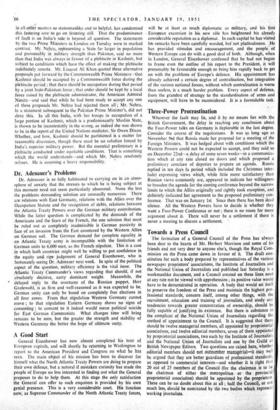Kashmir Unreason
One unhappy failure has marred the otherwise uniform success of the Commonwealth Prime Ministers' Conference. It is true that the Kashmir question was not discussed formally at the Conference table, but it was discussed informally, and the Dominion Premiers made most valuable suggestions regarding a solution of the problem. Only the obduracy—for it can be called nothing less—of Mr. Nehru, in all othi; matters so statesmanlike and so helpful, has condemned this festering sore to go on festering still. That the predominance of fault is on India's side is beyond all question. The statements by the two Prime Ministers in London on Tuesday were in marked contrast. Mr. Nehru, representing a State far larger in population and presumably in military strength than Pakistan, said no more than that India was always in favour of a plebiscite in Kashmir, but subject to conditions which have the effect of making the plebiscite indefinitely remote. Mr. Liaquat Ali Khan quoted three alternative proposals put forward by the Commonwealth Prime Ministers—that Kashmir should be occupied by a Commonwealth force during the plebiscite period ; that there should be occupation during that period by a joint Indo-Pakistani force ; that order should be kept by a local force raised by the plebiscite administrator, the American Admiral Nimitz—and said that while he had been ready to accept any one of these proposals Mr. Nehru had rejected them all ; Mr. Nehru, in a statement subsequent to the Pakistan Prime Minister's, did not deny this. In all this India, with her troops in occupation of a large portion of Kashmir, which is a predominantly Muslim State, is shown to be incontestably in the wrong, as indeed she was shown to be in the report of the United Nations mediator, Sir Owen Dixon. Whether, and how, Kashmir should be partitioned is a matter for reasonable discussion, though there must be no solution forced by India's superior military power. But the essential preliminary is a plebiscite conducted under equitable conditions. That is something which the world understands—and which Mr. Nehru resolutely refuses. He is assuming a heavy responsibility.



































 Previous page
Previous page